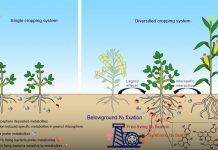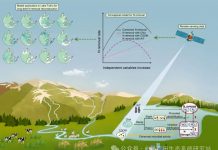Lai-Ming Huang Jin-Ling Yang Aaron Thompson David G. Rossiter Shuang-Miao Zuo Gan-Lin Zhang. Proton production from nitrogen transformation drives stream export of base cations in acid-sensitive forested watersheds. Ecological Indicators 2014 48: 348-357
Abstract
The biogeochemical cycles of nitrogen (N) and base cations (BCs) (i.e. K+ Na+ Ca2+ and Mg2+) play critical roles in plant nutrition and ecosystem function. Empirical correlations between large experimental N fertilizer additions to forest ecosystems and increased BCs loss in stream water are well demonstrated but the mechanisms driving this coupling remain poorly understood. We hypothesized that protons generated through N transformation (PPRN)—quantified as the balance of NH4+ (H+ source) and NO3_ (H+ sink) in precipitation versus the stream output will impact BCs loss in acid-sensitive ecosystems. To test this hypothesis we monitored precipitation input and stream export of inorganic N and BCs for three years in an acid-sensitive forested watershed in a granite area of subtropical China. We found the precipitation input of inorganic N (17.71 kg N ha_1 year_1 with 54% as NH4+–N) was considerably higher than stream exported inorganic N (5.99 kg N ha_1 year_1 with 83% as NO3_–N) making the watershed a net N sink. The stream export of BCs (151 1518 851 and 252 mol ha_1 year_1 for K+ Na+ Ca2+ and Mg2+ respectively) was positively correlated (r = 0.80 0.90 0.84 and 0.84 for K+ Na+ Ca2+ and Mg2+ on a monthly scale respectively P < 0.001 n = 36) with PPRN (389 mol ha_1 year_1) over the three years suggesting that PPRN drives loss of BCs in the acid-sensitive ecosystem. A global meta-analysis of 15 watershed studies from non-calcareous ecosystems further supports this hypothesis by showing a similarly strong correlation betweenPBCs output and PPRN (r = 0.89 P < 0.001 n = 15) in spite of the pronounced differences in environmental settings. Collectively our results suggest that N transformations rather than anions (NO3_ and-or SO42_) leaching specifically are an important mediator of BCs loss in acid-senstive ecosystems. Our study provides the first definitive evidence that the chronic N deposition and subsequent transformation within the watershed drive stream export of BCs through proton production in acid-sensitive ecosystems irrespective of their current relatively high N retention. Our findings suggest the N-transformation-based proton production can be used as an indicator of watershed outflow quality in the acid-sensitive ecosystems.







